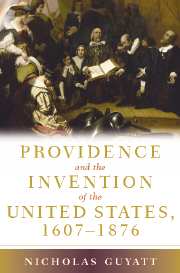Book contents
- Frontmatter
- Contents
- Acknowledgments
- Introduction
- PART ONE BRITAIN, AMERICA, AND THE EMERGENCE OF PROVIDENTIAL SEPARATISM
- PART TWO PROVIDENCE, RACE, AND THE LIMITS OF REVOLUTION
- 4 “Our Glorious Example”: The Limits of Revolutionary Providentialism
- 5 “Deifying Prejudice”: Race and Removal in the Early Republic
- 6 “Divided Destinies”: The Providential Meanings of American Slavery
- 7 “The Regenerated Nation”: The Civil War and the Price of Reunion
- 8 William Lloyd Garrison's Complaint
- Index
6 - “Divided Destinies”: The Providential Meanings of American Slavery
Published online by Cambridge University Press: 12 December 2009
- Frontmatter
- Contents
- Acknowledgments
- Introduction
- PART ONE BRITAIN, AMERICA, AND THE EMERGENCE OF PROVIDENTIAL SEPARATISM
- PART TWO PROVIDENCE, RACE, AND THE LIMITS OF REVOLUTION
- 4 “Our Glorious Example”: The Limits of Revolutionary Providentialism
- 5 “Deifying Prejudice”: Race and Removal in the Early Republic
- 6 “Divided Destinies”: The Providential Meanings of American Slavery
- 7 “The Regenerated Nation”: The Civil War and the Price of Reunion
- 8 William Lloyd Garrison's Complaint
- Index
Summary
On December 23, 1839, 219 years after the Mayflower dropped anchor off Plymouth Rock, Robert C. Winthrop rose to address the New England Society of New York City. The society could hardly have found a better person to deliver its annual lecture marking the Pilgrims' arrival in America. A direct descendant of the first governor of Massachusetts, Winthrop was also a rising star in the new Whig Party: just thirty years old, he was already Speaker of the Massachusetts assembly and seemed destined for a congressional career. (He was elected to the House of Representatives a few months later.) From his background and his prospects, Robert Winthrop was superbly qualified to address the progress made by America in the six generations since his ancestor's fabled career and to project a bright future for the nation in which he himself might play a prominent role.
The audience was not disappointed. Winthrop, treading in the footsteps of thousands of American orators, offered a familiar narrative in which the United States rose to global prominence under the direction of God. The landing at Plymouth had not merely determined the future of the English colonies but had shaped “the whole hemisphere” and shaken “the whole world.” Winthrop described a parade of providential events to contextualize the American achievement: God had hidden the American continent until the Reformation and the invention of the printing press; he had lured other Europeans away from North America with the promise of gold and silver to the south, leaving New England for the higher motives of the Puritans; and he had given George Washington the serene confidence that enabled him to challenge the world's foremost military power in 1775.
- Type
- Chapter
- Information
- Providence and the Invention of the United States, 1607–1876 , pp. 214 - 258Publisher: Cambridge University PressPrint publication year: 2007

